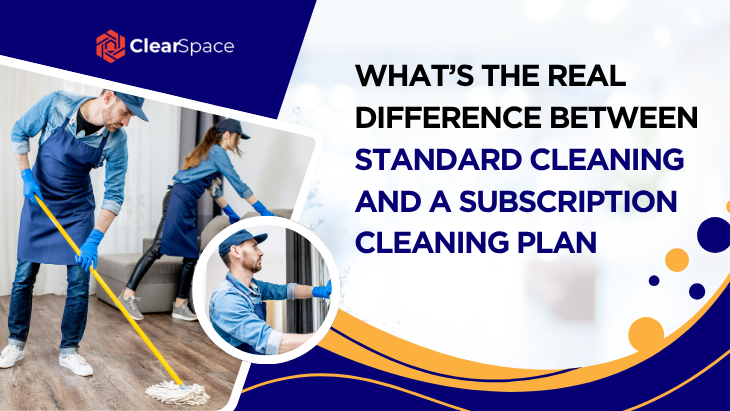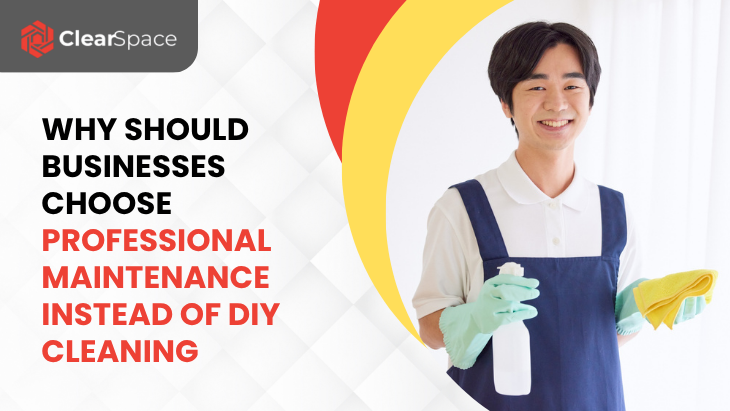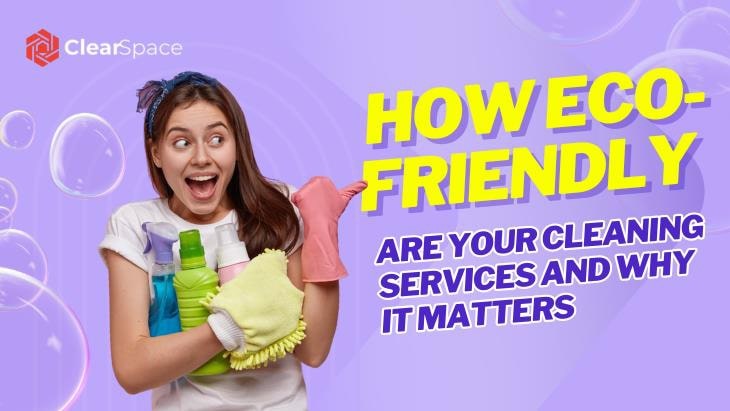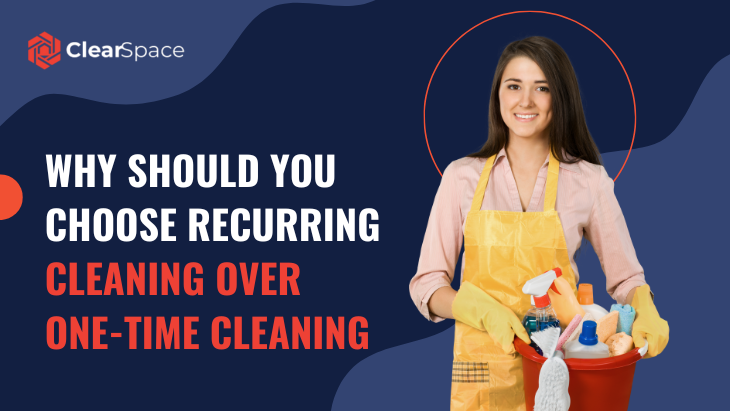Over the past few years, the cleaning industry has dramatically transformed. Trusted Cleaning & Device Repair Services What was previously regarded as a simple household task or one-off service is now a tech-savvy, convenience-led, customer-demand-driven sector. Today's consumer no longer desires only a tidy home or office they desire uniformity, consistency, and adaptability. This revolution has paved the way for subscription cleaning plans, a new model that contradicts traditional methods of standard cleaning services.
Whereas standard cleaning centers on individual, frequently ad hoc visits, subscription cleaning prioritizes long-term commitment, planned maintenance, and ease of convenience. Both provide cleanliness but differ drastically in the underlying framework, cost-effectiveness, service reliability, and customer experience. This distinction is vital to understand for homes and companies making a choice on how best to keep their environments in a progressively hectic world.
Understanding Standard Cleaning Services
General cleaning services are the conventional arrangement most are used to. Here, a client contracts a cleaning professional or firm for one-time work or sporadic visits when necessary. This may involve party cleanup, intense cleaning of a house prior to receiving guests, or intense cleanup of an office after construction. The emphasis lies in providing instant results as opposed to sustaining a regular pattern.
Normally, the routine cleaning comprises simple operations like dusting, vacuuming, mopping, disinfecting surfaces, and tidying up the areas. Clients phone the cleaner, schedule an appointment, and make payment after the job has been done. There is no long-term commitment—when the work is completed, the client-cleaner relationship could continue or not.
While this offers flexibility, it also means inconsistency. The cleaning professionals may vary from one booking to another, and the results can fluctuate depending on who is assigned. Standard cleaning suits those who require occasional help or have unpredictable schedules, but it often lacks the convenience and reliability that come with a structured plan.
The Rise of Subscription Cleaning Plans
Subscription cleaning plans are more contemporary in their style, reflecting shifts in other service businesses such as streaming, food delivery, or fitness clubs. Rather than scheduling an occasional session, customers sign up for a plan that delivers cleaning services at set intervals weekly, biweekly, or monthly.
This model focuses on continuity and consistency. The same professional cleaners are usually scheduled for a particular client, allowing them to get acquainted with the property and its specific demands. Subscription services typically come with customized cleaning schedules, reminders, adjustable rescheduling, and online management systems. Payments are automatic, and clients get to have fixed prices without having to renegotiate with each session.
The beauty of subscription cleaning is in convenience. Work-from-home families, office-goers, and corporate workplaces prefer to keep themselves clean when it's done as part of a planned schedule instead of an impulsive decision. This system not only takes time off but also creates mutual trust between the client and the service provider, leading to greater satisfaction and optimal results.
Consistency and Quality: A Key Differentiator
Perhaps the greatest distinction between subscription and standard cleaning is consistency. With standard cleaning, each visit may produce varying results, particularly when various cleaners do each task. With subscription cleaning, however, continuity is ensured by having the same cleaning crew on regular rotation.
This familiarity enables the cleaners to know the client's likes, like how to hold particular items, what particular areas require special care, or what cleaning products the client likes. With time, this creates efficiency and trust. The cleaners can proceed faster and better because they already know the layout and expectations.
Secondly, subscription cleaning businesses tend to have more stringent quality control procedures. Since they have a continuous relationship with customers, they are invested in providing consistent quality. Customer feedback loops, service ratings, and constant performance checks ensure top quality. Regular cleaning businesses might prioritize getting one task done over creating long-term customer satisfaction.
Cost and Value Comparison
A basic cleaning service might look less expensive on the surface since it entails a one-time payment. The long-term value, though, paints a different picture. Subscription cleaning plans, although they could have a recurring fee, tend to be more cost-effective considering frequency, convenience, and quality.
Most businesses provide discounts or loyalty rewards for members. For instance, clients who sign up for weekly or biweekly services could be offered lower rates than those who book individual sessions. Additionally, since cleaning occurs on a regular basis, grime and debris do not pile up as much, which lessens the effort and time consumed by each session. This can ultimately conserve time and money.
Conversely, clients using only normal cleaning might have to pay more for periodic deep cleanings when upkeep is avoided. The built-up grime, dust, or stains typically necessitate longer working hours and more time-consuming efforts. Therefore, even though normal cleaning seems less expensive upfront, it might be less cost-effective in the long run.
Flexibility and Customization
Both models provide different levels of flexibility, but subscription cleaning typically provides more personalization. Subscribers can customize plans to fit their particular needs selecting the visit frequency, the range of services, and even the time of day. Numerous subscription-cleaning businesses also provide add-ons such as laundry, window cleaning, or organization services at reduced prices for repeat customers.
On the contrary, regular cleaning tends to be restricted in preset packages. Because of independent bookings, customers will have to renegotiate each time they desire additional services or alterations. Subscription plans, however, work more like collaborations between the client and the cleaning firm, with common sense and constant communication facilitating ease of customization.
The flexibility to modify the plan as per the requirements of the season like spring cleaning, festive season preparations, or cleanup post-event brings in yet another wave of convenience to the subscription system. Customers value the security and comfort of knowing when they can schedule without the need to make multiple calls or inquiries.
Time Efficiency and Convenience
Time is perhaps the most precious resource in the modern world, and cleaning is one of those activities that usually gets put off in the wake of busy schedules. Subscription cleaning does away with the inconvenience of booking appointments all the time. With a plan in place, cleanings take place automatically at predetermined intervals, and customers can concentrate on other matters.
This is especially useful for commercial spaces and offices. It keeps work areas clean and hygienic, and employees are boosted in morale and productivity. Home customers also have peace of mind that their home will always be kept up without last-minute preparations.
Standard cleaning, on the other hand, is tedious to deal with. Scheduling a good service, checking if they are available, and coordinating calendars every time consumes effort. Additionally, last-minute bookings may be at higher prices or with limited availability, particularly during peak seasons.
Technology and Automation in Subscription Cleaning
Technology is also fundamental to increased usage of subscription cleaning services. Most contemporary organizations employ online platforms and cell phone applications that enable customers to book, pay, reschedule appointments, and give comments in real time. Others employ intelligent scheduling programs that use data to streamline cleaner routes, conserve time and fuel, and minimize environmental footprints.
Subscription customers also enjoy reminders and alerts so that no appointments get missed. This efficient integration of technology with service provision augments customer experience and increases transparency. Regular cleaning services, however, tend to use word-of-mouth communication and are consequently less effective in managing repeat customers or modifications.
Relationship Building and Trust
A cleaning business is founded on trust granting someone entry to your professional or private space entails faith in their dependability and honesty. Subscription cleaning establishes that wither over time. Regular visits from the same cleaning experts create familiarity, relaxation, and responsibility. Customers can anticipate who will arrive, and cleaning staff establish a sense of ownership and pride in preserving the property.
Regular cleaning usually entails various workers each time, and this can make customers apprehensive or uncomfortable. The inconsistency might lead to variable quality and less individual care. Subscription services solidify client-practitioner relationships, which improves communication and long-term satisfaction.
Environmental and Ethical Considerations
Sustainability is a marker issue in contemporary service businesses, and cleaning is no different. Subscription cleaning plans usually include green practices as part of their regular offerings. Because they work on a subscription schedule, these firms can handle inventory effectively, minimize waste, and use green products for cleaning.
In addition, long-term contracts enable them to invest in recyclable materials and energy-efficient machinery. This not only has positive environmental implications but also improves the image of the brand for both the cleaning company and the customers. Traditional cleaning companies, however, might not be focused on sustainability because their contracts are short-term and transactional.
For green-conscious customers, subscription cleaning offers a convenient method of staying clean with a reduced environmental footprint.
Why Subscription Cleaning Is the Future of the Industry
The increasingly global trend toward convenience lifestyles implies that the future of the cleaning industry belongs to subscription models. Just like humans subscribe to food boxes, streaming services, and personal care products today, cleaning subscriptions are a perfect fit into this on-demand culture.
With the innovations of automation, environmentally friendly technologies, and customer experience design, subscription cleaning provides a new, efficient, and environmentally friendly solution. It caters to those who care about time, reliability, and consistent quality more than sporadic, uncertain setups.
Traditional cleaning will always be there for one-off or short-term requirements, but for those who need continuous cleanliness and peace of mind, the subscription concept evidently is the better option.
Conclusion
The true difference between traditional cleaning and subscription cleaning plans extends far beyond frequency it involves philosophy. Clearspaceinc Traditional cleaning is all about short-term outcomes, whereas subscription cleaning is about cultivating habits of cleanliness, comfort, and reliability in the long run.
Subscription cleaning brings convenience, technology, consistency, and sustainability into daily life. It eliminates stress, saves time, and keeps homes and offices fresh and inviting. Routine cleaning, although flexible, can fall short of the continuous care that contemporary lifestyles require.
Ultimately, the decision lies within individual needs and priorities. For the spontaneous types, regular cleaning is enough. But for businesses and individuals who place importance on order, productivity, and constant cleanliness, subscription cleaning is the future a future where cleanliness becomes not only a service but also a way of life.





Leave a reply